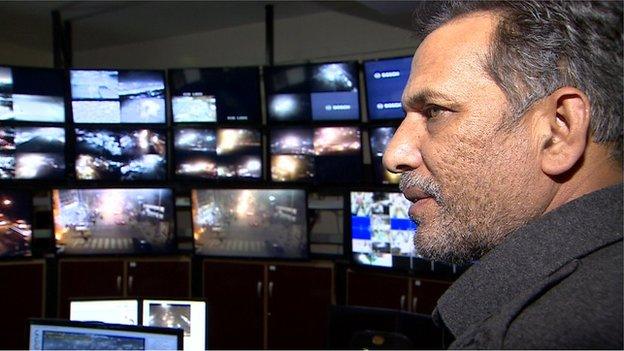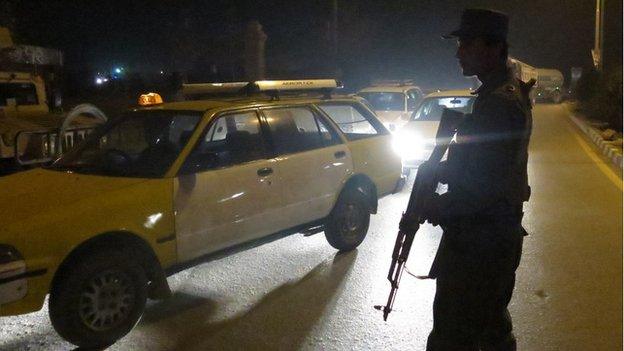Afghan attack: Anatomy of a suicide blast
- Published
How the suicide bomber almost killed Zahir Zahir
The stress of a job he had only being doing for a year was etched into the face of Kabul's police chief, Zahir Zahir.
His eyes had a look of exhaustion around them and he apologised for his unshaven, unkempt appearance as our cameraman got ready to start recording the television interview.
A barber had been waiting at his office all day, poised to smarten him up, but the police chief's schedule had been so packed there had been no time.
Mr Zahir was speaking to us during an upsurge of Taliban attacks in the Afghan capital which have killed dozens of Afghans and several foreigners, including American soldiers, British embassy staff and South African aid workers.
In one of the most sophisticated attacks, the police chief himself had been the target of a suicide bomber who had reached one of his offices in the heart of the heavily fortified Kabul police headquarters.
It was sheer luck that Mr Zahir had not been there at the time.
"I was running a seminar with a foreign delegation," he said. "When he [the bomber] came to my floor, he asked the guards where I was and they told him I was in my other office. I am normally in that office every morning at that time to sign documents for people."

Mr Zahir is fatalistic about his own chances but certain that foreign forces would step in if help was needed to combat the Taliban
'Inside job'
Mr Zahir, who had been delayed by a few minutes at the seminar, was about to go to that office when the bomb went off, killing his chief of staff and injuring six visitors.
He was convinced the Taliban had inside help enabling the suicide bomber to get through security checks.
"The Taliban have infiltrators, spies inside some places," he said. "One of them, who knows a lot of people here, brought the suicide bomber into the compound in a police vehicle which went past the checkpoints and was barely searched. He was then dropped off by the staircase."
The guards at the final checkpoint, at the entrance to the building, did apparently search the bomber, but failed to find the powerful explosives which were hidden in his underwear.
Even now after this huge lapse in security, there are no X-ray machines, metal detectors or other scanning equipment to prevent further attacks.
Instead, the large numbers of people going in and out of the building every day are all searched by hand.
Mr Zahir, who had survived several other assassination attempts in the past, was fatalistic.
"When I leave home, I say goodbye to all my family and I assume I will not be going home that night," he said.
"Even now as I am sitting with you, I think something will come out of your camera to kill me or someone will come in from the corridor to blow me up.
"I am prepared for it every minute. I serve my people and country, I don't care for my own life."

Checkpoints around Kabul have failed to stop some suicide bombers from getting through
Show of strength
Such fatalism seemed strange for a man who bore primary responsibility for the security of Afghanistan's capital at a critical moment of transition.
With the withdrawal of most foreign troops now almost complete, the Afghan police and military will soon be virtually on their own in the fight against the militants.
Already over the past year, the Afghan security forces have suffered very heavy casualties as they have taken the lead in combat operations.
And now the Taliban have stepped up their attacks in the capital, showing they can carry out suicide missions almost at will, including against the expatriate community.
It is a clear message the militants remain a force to be reckoned with and that they intend to pursue their goal of forcing all Westerners out of the country.
It was no surprise, then, that the police chief confirmed they would continue to be dependent on help from the residual Nato force of approximately 12,500 troops which will remain in the country next year.
It is supposed to be focusing more on training and advising the Afghan security forces rather than getting involved in combat operations.
But Mr Zahir had no doubt they would help with operations against the Taliban when needed.
"If we need their support and it's urgent, the [Nato] generals won't ask for permission from their bosses, they will come immediately," he said. "They would send planes and even ground troops."
But Zahir Zahir himself will not be the man calling Nato commanders for their assistance. Not long after giving the BBC this interview, he resigned.
No reason has been given but it is thought to be in connection with the recent suicide attacks by the Taliban in Kabul which left the police looking helpless in the face of the onslaught.